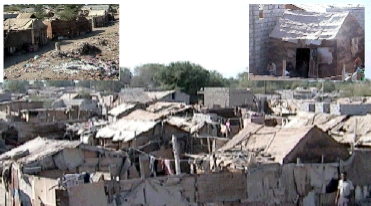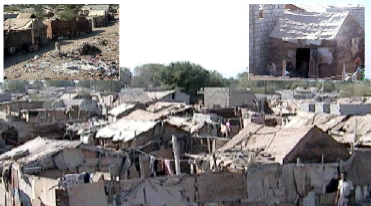
Aden Slums, Outright Authorities Negligence [Archives:2001/02/Reportage]
January 8 2001
Radhwan al-Saqqaf
Aden Bureau Chief
Poverty is becoming a headache plaguing many countries of the world, of which Yemen is part of. It is a major issue holding a world-wide concern, especially as there is an ever increasing gap between the haves and the have-nots. In Yemen, particularly in poor neighborhoods of main cities such as the governorates of Sanaa and Aden, there are many unimaginable poverty levels resembled in extremely poor families that were never given the chance to create conditions for a decent living.
Here, in this article, I present the case of Aden slums that exist in one of the most devastated neighborhoods in the country. In many governmental newspapers and media organs, the negative side of the facts are never shown. It is sad to see that they have failed to deliver the truth of what is happening around us.

It was difficult for me to believe that such an unbelievably poor neighborhood could exist in the governorate of our economic capital. Before going into the shocking details, let us take a brief journey into the facts about poverty in the global sense, i.e., poverty in the world, and then come back to Aden.
Poverty was and continues to be one of the outstanding issues dealt with in many international conferences. The World Summit for Social Development held in Geneva was one of these conferences in which poverty was given a specific focus and significant attention. During this conference, UN Secretary General Kufi Anan reviewed a complete report about poverty published by the UN in cooperation with the World Bank and some other international organizations. He said We believe that we can have a better world and put the new international market in the hands of the poor. We believe that globalization can be a positive force in the lives of all the people.
The report defined the poorest people by indicating that they were those who maintain their living at an income less than one dollar per day. The report revealed that 1.3 billion of the worlds people, equal to 24% of the worlds people, survive on less than $ 1 per day. What is also amazing is that there are 3 billion people in the world today -half of the worlds population- struggling to survive on $2 per day. These statistics are hazardous omens of the visible deterioration of this epidemic in the poor countries which constitute 85% of the countries on this planet.
To be more precise, 29% of the worlds population live in South Asian countries, which are the home of about 43% of the worlds poorest population. Statistics become more horrifying when coming to the incredibly high unemployment levels in third world countries, which continues to rise by the year. The estimated number of unemployed qualified people exceeds 150 million in the world.
Coming back to Yemen, let us take the whole country in general, and then come to the particular case of Aden slums. It goes without saying that Yemen is among the poorest and least developed countries in the world. Official statistics of the annual report of the national family survey for 1998 issued by the Central Statistics Authority revealed the increasing number of the poor in Yemen. Undoubtedly, this leads to many negative social and economic phenomena that would be difficult to avoid. The report indicated that the per capita income per day in the country was YR 28,2, which is incredibly low.
As a matter of fact, it has become almost impossible for many families with such low incomes to bear the ever-increasing waves of price hikes in the basic foods supplies, let alone other essential products. Its only wise that the authorities concerned would make use of the statistics they release every year, and instead of putting them in books and forgetting about them, study their causes and concern themselves in identifying the reasons and setting up an agenda for action to alleviate further decline in the standard of living according to a chronological framework.
Poverty is found everywhere in the Republic, especially in cities and towns. Aden is a governorate in which the miserable condition of many poor families has come to a sheer misery. There has been an increasing number of poor families living in Daar Saad, a poor town in the governorate of Aden known for its incredibly low standard of living. As you get into the town you are to pass by these cottages accumulated in the area. The pictures above perfectly show the extent of their misery. A close look at the picture could explain what words cannot.
Yemen Times made an effort in trying to take a closer look at the conditions of the people living in Daar Saad. We went to one area called al-Ushosh and started talking to the residents. We headed towards one of those houses where we found some children wearing down-at-heal clothes. Mr. Ali Muhsen, the owner of a small wood cottage, spoke of their calamities and said Ive lived here since 1991 when I came back from Saudi Arabia and could not find any job. I searched everywhere, however, all to no avail. Then, I bought a wheel carriage and bought some toys and chocolates with the money I saved during my exile, and went selling in the streets to make ends meet. I earn YR 250 as a daily income. However, that could hardly cover my familys most basic needs. I am supporting a family of four children and a wife. In this area almost all the families have similar stories and suffering the same way as me and my family.
Then, we made a short chat with another person named Ahmad bin Ahmad Thabet. He did not allow us to take a picture of him and said We do not beg any help from whoever. All I can say to whoever is interested in helping us should come to the area and see our situation which is similar to that of the African refugees. Oh no, even worse. At least the conditions of refugees may be better than us in terms of receiving some international aid. I have been living here since 1993 under the mercy of the suns heat and winters cold nights. I cannot build a house or buy a plot of land. Hence, this is where I turned to live in. Recently, I was able to find a job in a mechanics workshop for YR 4500 per month. I have a family of two children and a wife. My brothers situation is not at all better than mine. He is a porter. He sometimes works and spends weeks without a job. But we never beg, we continue to live with our dignity.
We asked if they receive any kind of assistance or aid, and he replied, Sometimes we receive some aid in terms of Zakat during Ramadan from some merchants, but that is all.
When asked whether they receive any assistance from the government, he laughed desperately and said How can they help us when they are in fact trying hard to drive us out of these lands under the pretext that these houses were built randomly?!
After a few hours of wandering in the area and chatting with residents and listening to heart-breaking stories, we decided to leave the place, as we realized that we were slowly attracting hundreds of desperate residents, who crowded around us complaining about the government continuous ignorance and neglect. We were told that there were some families with no one to support them, living in absolute poverty eating the leftovers and fearing death from hunger or disease. We were totally shocked and could not talk more.
Later, we headed towards an area called al-Basatin located in the entrance of Aden. The area is surrounded by high and lofty hotels and buildings along the road to Sheikh Othman. Behind these fancy hotels and fine buildings, there was an unpaved road less than 1 km long, leading to al-Basatin, another area full of stories of misery and injustice. The area is inhabited by thousands of Somali Refugees. Near to them there are many Yemeni poor families living in distressed houses and undergoing another challenge of the struggle to survive in the harshest conditions imaginable.
We went to one of these houses and we could only find a woman sitting with some children on the side of the lane. We approached her and informed her of the purpose of our visit and asked about their conditions. She said, My husband, my 5 children and I have been living here for ten years in total poverty. My husband is working as a driver for a company with YR 6500 salary per month. I tried to help him by making some ice-cream, which my children would sell to the near-by living Somali refugees, who are in better conditions than ours.
Then we went to a strange cottage that attracted our attention. It was about 2 meters in diameter and we wondered who would live in there. A passing-by boy told us that an lonely old woman was living in that cottage. After a few moments, she came out to tell us that the people of the area cooperated to build this cottage for her. She has nobody to depend upon and nowhere to go, and she had no where to stay until the cottage was built. She survives on what is given to her from the neighboring houses who are suffering from similar conditions, but are still kind enough to offer her some bread and leftovers.
The misery of these people could not be described in words. They are suffering a lot and could hardly survive in such deplorable economic conditions and continuous price increases. It was striking to know that most of those families came back from Gulf countries after the Gulf crisis. They came to their country with no goal but to live peacefully in their homeland, with dignity and pride. However, almost all of them regretted coming back to Yemen from exile.
It is truly saddening to see how these people are living their lives. Arent they human beings, with rights which are ensured by the constitution and the international conventions of human rights, which Yemen signed and approved not long ago? Their simplest right which is to live and survive is not ensured.
I hope that through this article, we were able to send a clear message to concerned authorities and international humanitarian organizations working in the field of human rights and humanitarian services in Yemen. We hope that they could pay a visit such areas and try to find solid solutions for these people, who continue to suffer every day.
——
[archive-e:02-v:2001-y:2001-d:2001-01-08-p:./2001/iss02/report.htm]


